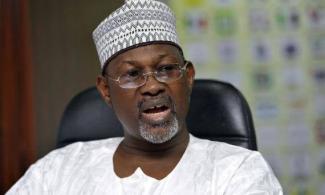
Jega noted that Nigeria had been dubbed as one of the most corrupt countries in the world, and has also been ranked one of the most complex corruption environments.
A former Chairman of Nigeria’s electoral umpire, the Independent National Electoral Commission (INEC), Prof Attahiru Jega, has said that no amount of disagreement can change the fact that Nigeria has been globally recognised as one of the most corrupt countries in the world.
Jega made the assertion while speaking on the topic, “Corruption and the Education Sector in Nigeria” in his keynote address at the 4th National Summit organised by the Independent Corrupt Practices and Other Related Offences Commission (ICPC).
The summit was on the theme, “Diminishing Corruption in the Public Sector” at the State House Conference Centre, Abuja.
According to him, corruption drains billions of dollars yearly from the country’s economy under the present government and Nigerians struggle daily to cope with its effects.
Jega noted that Nigeria had been dubbed as one of the most corrupt countries in the world, and has also been ranked one of the most complex corruption environments and perennially ranks in the bottom quartile of Transparency International’s Corruption Perception index.
“Nigeria’s 2021 rank is 154 out of 180 countries, with a score of 24 over 100 (transparency.org). To paraphrase Chinua Achebe, the ‘Trouble with Nigeria’ is corruption.
“No matter how we disagree with Transparency International (TI) on its methodology and criteria for ranking countries using the Corruption Perception Index (CPI), this is globally recognised, and the creation has already been created that Nigeria is terribly engulfed by corruption; as is often said, perception sometimes is more consequential than the reality,” Jega said.
Speaking further, Jega explained that “This relatively very poor record and ranking is essentially on account of the humongous corruption associated with what is known about its extent and magnitude in the Nigerian public sector, especially at the federal level.”
He added that corruption was more embedded at the state and local government levels, upon which less attention was focused.
He lamented that “Corruption is the single greatest obstacle preventing Nigeria from achieving its enormous potential” as “It drains billions of dollars a year from the country’s economy, stymies development and weakens the social contract between the government and its people,” hence “Nigerians… struggle daily to cope with its effects.”
Jega further stressed that “The endemic and pervasive nature of corruption in Nigeria negatively impacts human security, as well as democratic and socioeconomic development. “This is essentially because the nature, extent and dimensions of corruption are no doubt associated with bad governance, and the inadequacy of institutional framework to effectively address it. Hence, public officials occupying elected/appointed public offices in trust convert those for private gain, often with impunity and crass disregard for due process, accountability and ethical conduct.”
He therefore noted that to ultimately address corruption decisively and impactfully, if not permanently in the Nigerian public sector, requires “remarkable, systematic value additions to governance and democratic development.
“In the short to medium terms however, a comprehensive, targeted sectoral and multi-tier anti-corruption campaigns, with an excellent legal framework, strong anti-corruption agencies/institutions, led by selfless and fearless appointed public officials, would bring about incremental positive changes.
“Clearly, we should focus on this, while we work hard to improve and develop our country’s governance framework and systems, and accelerate democratic development, a key aspect of which is increasing/improving the integrity of our elections.”